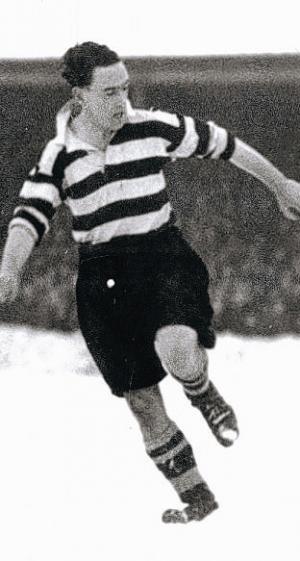

Clarke: James Henry (Harry)
1947-1947
(Player Details)
Centre Forward
Born: Broomhill, Sheffield: 27-03-1921
Debut v Wolverhampton Wanderers (h): 22-02-1947
5’6 1/2” 10st 2lb (1947)
Clarke began with Mexborough, Bradford City and Goole Town, and then joined Rotherham
United in May 1937 as a speedy Outside-Right. A much travelled winger, he had scored
twenty-one goals to help Goole Town to the Yorkshire League championship the season before
he joined the Millers. He didn't force his way into the Rotherham side until Christmas
Day in his first season, but was then an ever-present after making a tremendous early
impact. Although he was small in stature he helped to lay on a many goals for Arnold
Bramham and was no stranger to the scoresheet himself and added nine goals to his own
account. That included a sequence of scoring in six out of seven games starting with one
on his debut, a 3-2 win at Chester City and he continued to link up well with Bramham once
again in his second season. He scored nine goals in twenty-four League games in his first
season of 1937-38 and four goals in thirty League appearances in 1938-39, together with
another three games in the F.A. Cup. He stayed at Millmoor and played through most of the
War Years. He made eleven appearances in 1939-40, five in 1940-41, and then scored six times
in eighteen appearances in 1941-42, five goals in twenty-nine games in 1942-43 and played
four times in 1943-44. After a spell with Gateshead where he had one game in 1942-43 and
four games in 1943-44, without scoring, he moved to Darlington in April 1946, after having
scored one goal when he guested twice for the Quakers in 1943-44 and then scored twenty-five
goals in thirty-three games in 1944-45 and forty-six goals in thirty-five games in 1945-46.
When the Football League recommenced after the end of the War he had already rattled in
seventeen goals in nineteen games, when he was transferred to Leeds United in February 1947
as his goalscoring record suggested he might be the answer to Leeds United’s problems.
Leeds paid £4,000 to boost their flagging attack for the free scoring Darlington centre-forward.
In his words here is what happened, "We were all going on the train to Tranmere
and Billy Forrest was the manager,” he said. “He came down the passageway of the coach and
told me, ‘We’re getting off at Leeds.’ I said, what are we doing, going for a dance or
something? Something daft. They were bottom on the league then and they hoped I’d get them
out of it and I was talked into it and signed at 4.30 on the Saturday morning – I was
playing against Wolverhampton that afternoon!" The deal misfired and in fourteen
appearances, he managed only one goal and never finished on the winning side. He returned
to Darlington in November 1947 and began scoring again, amassing twenty-four in
thirty-seven appearances. In late November 1949 he went to Hartlepool United, where he
made his debut on 3rd December 1949 at home to Tranmere Rovers in a 2-0 win and he scored
once in seven League appearances and once in two F.A. Cup appearances before playing his
final game for the Monkey-hangers in a 1-3 home defeat by Mansfield Town on 18th March
1950. He later joined Stockton in July 1950, before returning to Darlington for a third
time in September 1952. He stayed at Feethams until retiring at the end of the 1952-53
season in June 1953 having scored twelve times in fourteen games in his third spell with
the Quakers. Clarke had always been a keen cricketer, indeed he openly professed to
cricket being his favourite game. So it came as no surprise when he continued to play
cricket after his retirement from football. An accomplished cricketer, he made forty-six
Durham County appearances, hit one thousand and ninety runs including a half century
against New Zealand and took twenty-four wickets, his best being seven for thirty-four
against Northumberland, and also played in 1945 against an Australian RAF side that
included Keith Miller. The score card remains his only sporting memento. He represented
Durham from 1948 to 1953 and North Yorkshire and South Durham League Durham XI in 1939 and
was the Professional with Darlington Cricket Club in 1949. He played cricket professionally
until about 1960. He also worked as an engineering draughtsman at Darlington Forge, until he
was made redundant in 1968 and then got a job as a draughtsman for Northumberland County
Council. On 18th April 2006, he was honoured with Life membership of the Darlington Football
Club, after just celebrating his eighty-fifth birthday.